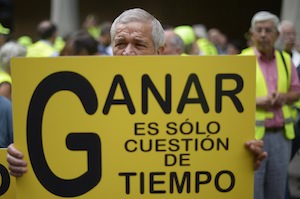‘Robbed of Their Right to Die in Peace’
A picture of betrayed trust emerges in reports of the bank theft of the last group of Spaniards who seem to have any money -- hundreds of thousands of elderly pensioners.
A picture of betrayed trust emerges in reports of the bank theft of the last group of Spaniards who seem to have any money — hundreds of thousands of elderly pensioners.
The Independent reports:
The pensioners who turn out to protest say they are victims of Spanish banks such as Bankia, which took their savings in the full knowledge that their retirement funds would be plunged into a financial black hole. After Spain’s property bubble burst in 2008, the banks sought to balance their books, and around 300,000 families say they were encouraged to convert their savings into complex preference shares that typically pay out a fixed dividend. Rather than being warned of the inherent risks, the protesters say they were reassured that as a financial option, the preference shares could not be safer.
According to the bank consumer association ADICAE, some 80 per cent of those buying preference shares were pensioners, many using their life savings to do so. But in 2012, when Bankia, Spain’s fourth largest bank, was nationalised along with three other lenders and bailed out with €42bn in EU rescue loans, those small investors found themselves partly shouldering the banks losses, as stipulated by Brussels’ rescue conditions. Thus Spanish pensioners who had collectively bought around €30bn in preference shares saw their investments’ real value plummet, and their savings go up in smoke.
One 91-year-old man bought $81,000 in Bankia’s “preference shares,” which are the equivalent of stocks. “Imagine how my father feels when they tell him, at his age, that at best he may get some money back in 10 years’ time,” the man’s son said. “… He can’t use the money he’s been saving all his life and we don’t know what is going to happen.
“He trusted the bank, and when the manager told him about preference shares he said that it had a bit more interest and that it was completely safe. But it was actually a product that was a complete con, we weren’t informed of the real risks, and now we feel completely let down. What really hurts is having to spend even more money to try and get back something that was ours in the first place.”
The Independent adds:
In Spain, banks had been seen as institutions worthy of trust before the crisis, says ADICAE analyst Jezabel Arias. “There has always been a real culture of respect towards bank managers, what they told customers was right for them tended to be blindly believed,” she says.
This made some depositors with little financial expertise more vulnerable, she says, adding that the elderly were natural targets for sales of preference shares by cash-strapped savings banks because when the recession struck “they were the ones with the most money”.
Some of the banks’ sales staff were instructed to tell pensioners that they had sold the same preference shares to their own families, Ms Arias claims. “But when the pensioners came in and started shouting at the managers [saying] they’d been conned, the banks had shifted their staff around to different offices so the new ones could say ‘well it wasn’t us who was responsible’,” she says.
By July 2013 Bankia had received 183,176 arbitration requests. So far, only 24,000 of those cases have been resolved in favor of investors, an analyst says.
— Posted by Alexander Reed Kelly.
Your support matters…Independent journalism is under threat and overshadowed by heavily funded mainstream media.
You can help level the playing field. Become a member.
Your tax-deductible contribution keeps us digging beneath the headlines to give you thought-provoking, investigative reporting and analysis that unearths what's really happening- without compromise.
Give today to support our courageous, independent journalists.






You need to be a supporter to comment.
There are currently no responses to this article.
Be the first to respond.